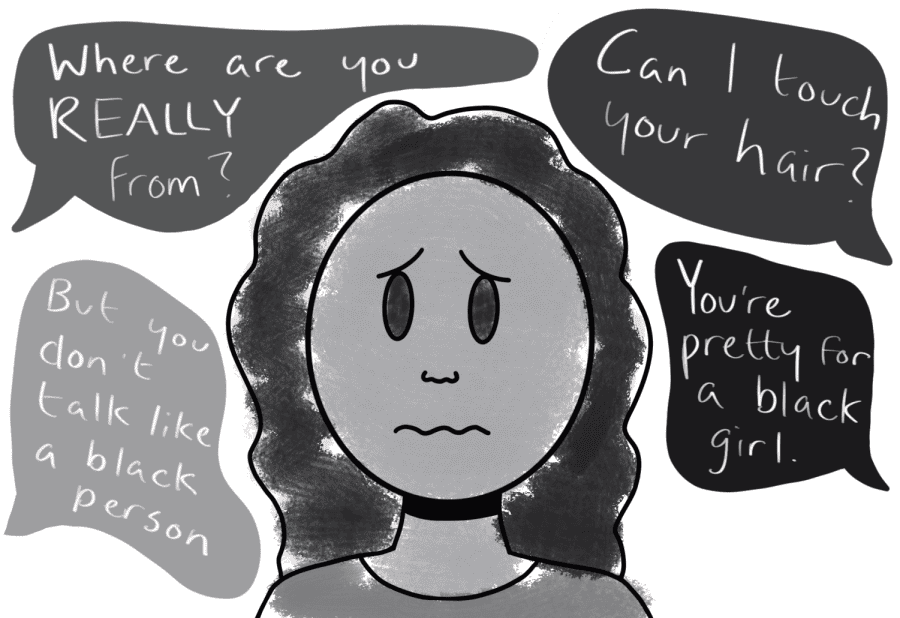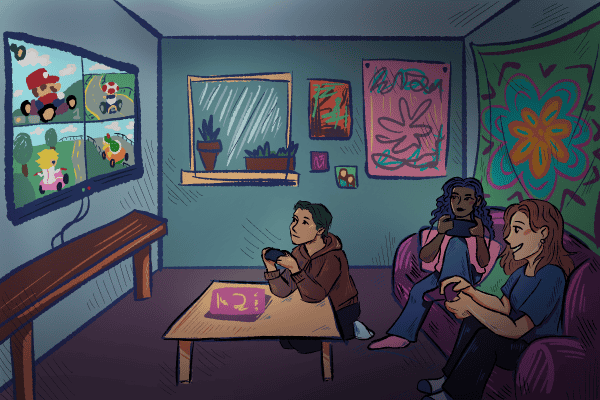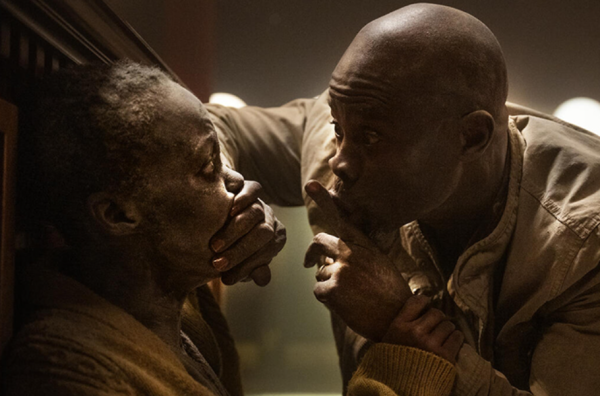What are microaggressions?
October 21, 2021
People of color have to deal with being watched in stores or facing backhanded compliments about their appearance. These are microaggressions.
According to Merriam-Webster, the definition of a microaggression is “a comment or action that subtly and often unconsciously or unintentionally expresses a prejudiced attitude toward a member of a marginalized group.”
There are three different types of microaggressions: microassaults, which are verbal and nonverbal racial actions; microinsults, or subtle actions that can be viewed as racist or extremely offensive; and microinvalidations, actions used to invalidate the experience or feelings of someone.
Macroaggressions are a more intentional and direct form of discrimination.
Micro- and macro aggressions are a common experience for people of color and can occur anywhere.
According to an article from Lean In, microaggressions are common for women in the workplace. Since Black women face both racism and sexism, “they experience a wider range of microaggressions than women overall,” the article says.
Kylan Foster is a senior majoring in management information systems. She encountered a microaggression at her job as a desk assistant for being “too quiet.”
She said she often didn’t engage in conversations with her co-workers because she didn’t feel welcome. Her co-workers misinterpreted her silence as standoffishness. She also noticed a pattern of other co-workers, who were women of color, being painted as angry.
“I got written up for not making eye contact with a person. She could have possibly not known I made eye contact. Then she said I was becoming a constant problem. Me and the other people of color were disruptive, we were aggressive, and we made people feel uncomfortable because we didn’t engage in their conversations,” Foster said.
Lean In said 54% of Black women report that they are often the only or one of the only Black people in their workplaces. With the scrutiny Black women face, the workplace can be a harrowing setting.
These issues often leave Black women afraid to express themselves because of the fear of being misunderstood. Only 26% of Black women felt that they had allies at work, and 36% of Black women faced consequences when they spoke out against discrimination at work.
Not only are Black women discriminated against for their emotions, but they are also scrutinized over their hair.
In a research study from Duke University, Black women with natural hairstyles were seen as more unprofessional than Black women with straightened hair. Also, according to research from Dove, 80% of Black women felt the need to alter their natural hair in order to fit in at work.
In 2018, a Black news anchor was fired for wearing her natural hair.
These aggressions have very strong effects on individuals’ mental and physical health.
According to Harvard psychiatrists, microaggressions “can result in everything from depression, fatigue and anger to physical ailments such as chronic infections, thyroid problems and high blood pressure.” This shows that a small comment can affect someone negatively in many ways.
Since microaggressions are subtle, some people find it hard to express themselves without feeling that they are overreacting.
“Often the person experiencing the microaggression will have others state that ‘you are being overly sensitive’ and that microaggression ‘didn’t happen or wasn’t meant in that way.’ The person experiencing the microaggression is having their feelings invalidated, and when people are invalidated, they are left feeling unheard and as if they don’t belong,” said Jennifer Turner, UA assistant director of clinical services.
Microaggressions can affect a person’s confidence so much that they start to constantly question themselves, which eventually causes a downward spiral.
“When a person is experiencing microaggressions it may become difficult for a person to engage with others. The person experiencing a microaggression may have issues with being late or calling out from work or class because of feeling ill,” Turner said. “In reality, the microaggression that they experience daily in a particular space may make it difficult for them to come to work every day.”
However, microaggressions don’t define a person, and some people find it easier to let the situation go. This helps them gain peace so that they can enjoy their college experience.
“I overcame the feeling by honestly letting it go. I grew to love myself, and I do not care what other people think of me at the end of the day,” said A’Nya Hester, a junior majoring in the multiple abilities program.
Hester said she has enjoyed her college experience despite the constant microaggressions she has faced.
“I will educate the ones who made me feel uncomfortable, but for those who don’t budge? I will not lose sleep over it,” Hester said.
Microaggressions affect each person differently, but one comment can affect someone’s confidence, health and future.
As people attempt to become more culturally aware, it is important to understand that part of that change means taking into account the harmful effects of microaggressions.
This story was published in the Legacy Edition. View the complete issue here.
Questions? Email the Culture desk at [email protected].











